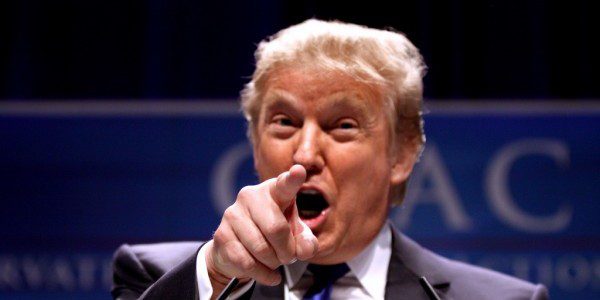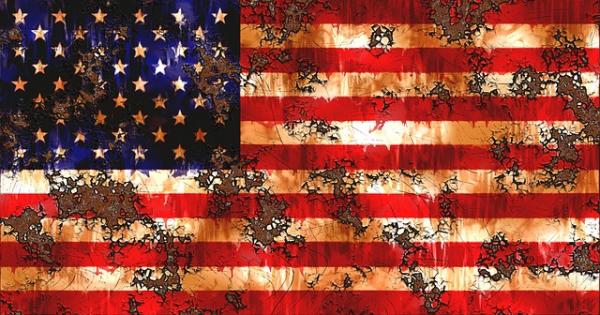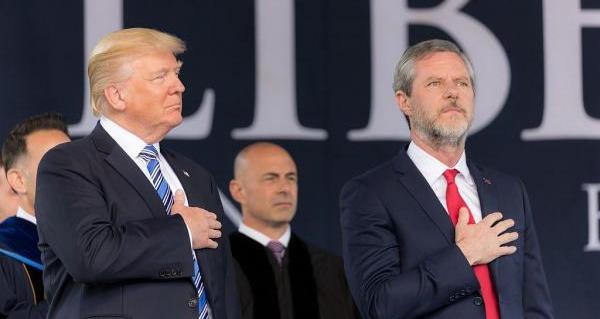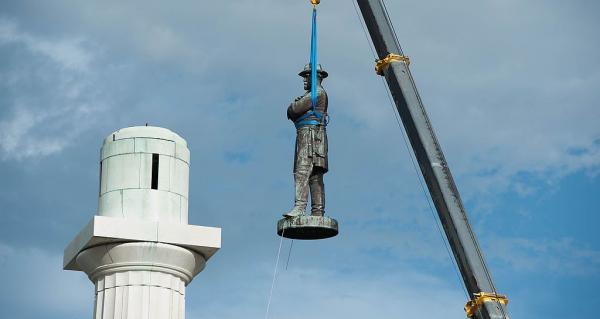Lot’s of folks have analyzed, dissected, and speculated on the appeal of Donald Trump.

We keep hearing that he’s going to slide away into the dust heap of presidential-candidate-has-been, those blips on the radar that pop up once in awhile and grab the headlines, only to fade away as a distant memory of a “strange cultural moment.”
It’s often been said that Trump is this year’s Herman Cain, but Trump has been hanging around much longer than Cain ever did. In fact, he’s not just hanging around, but still quite firmly in the lead. He’s had a consistent, approx., 25% hold on the polls, 2-3% or so over second-place Ben Carson. Recent polling in two states, Nevada and South Carolina, suggests his lead is hardly precarious and probably not fleeting.
An Inquistr article reflects on the most recent polling data:
Trump leads second-place Ben Carson 38 percent to 22 percent in Nevada, and in South Carolina is beating Carson by a margin of 36 percent to 18 percent. There are no other candidates with double-digit support in either state.
Both polls seem to indicate that Donald Trump is building his lead in the polls. Nationally, he has drawn about 25 percent of voters, but had also seen his leads level out or even dip slightly. Some experts thought that voters were starting to grow wary of Trump and his very loud brand of politics, but the leads in Nevada and South Carolina could say otherwise.
Trump success cannot be fully explained by his flashy reality star persona or his promises to “make America great again.” However, his charisma and his brash, take-no-prisoners, tell-it-like-it=is approach does seem to tap into some primal instincts and fundamental anxieties of the homo sapien. In other words, to get to the bottom of the “Trump appeal” we may have to drill down deep into the human psyche.
When I read the section called “Heroic Nationalism and Charismatic Leaders,” from the fascinating book, the Worm at the Core, I couldn’t help sensing that it cut to the heart of the reason for the Trump appeal.
First, the larger context: The authors, proponent of the field of study called “Terror Management Theory,” argue that death anxiety, caused by the awareness of our mortality, our precariousness as frail creatures, and the inevitability of our demise, is a massive factor in how we live. Death anxiety shapes how we understand ourselves, how we relate to others, and how we organize our lives. Part of the power of mortality awareness (death anxiety) is that it often goes unnoticed, because we have developed the capacity to psychologically repress it. Precisely because we repress it, it often erupts in negative and even destructive ways. We often act without knowing why we act–and that’s often not a good thing.
One way we respond to the anxiety caused by death awareness is by developing or adhering to immortality projects; these can be literal immortality projects (beliefs in a literal life after death) or symbolic immortality projects (participating in the many avenues of culture that provide a sense of permanent meaning or a lasting legacy–we get the sense that something of our “selves” will go on, even after we physically die, because we have been a part of something greater than ourselves). Symbolic immortality is also offered to us by the powerful and charismatic leaders who invite us to transfer our fears, anxieties, and insecurities onto them. In turn, they allow us to “borrow power” from them, such that we can better manage the existential terror of mortality and of our precariousness.
The best way to deal with death anxiety is by building up self-esteem. Powerful leaders, whether political, religious, or otherwise, are channels of self-esteem for the rest of us. We often don’t feel in control of our lives, but we can imagine that our leaders are. We often feel insecure, but we imagine that our leaders feel (and are) secure.
We are drawn to the heroic leader and we can overlook any number of their sins, flaws, or points of disagreement with them–so long as our own self-esteem is strengthened by giving them our allegiance. We transfer our basic anxieties and hopes onto our charismatic leaders in return for our political, religious, and financial allegiance. This is why nationalism works so well and it is why certain leaders rise to the top of the heap, particularly during a time of instability or crisis.
So now for the key section from the Worm at the Core:
Nationalism acquires a sacred dimension when group identity is strengthened by the sense of being “chosen people” of distinctive character and origin who inhabit a hallowed homeland with a heroic history and a limitless future. And those who die for their country are immortalized in song and story, ceremony and monument. …
“Every group, however small or great,” Otto Rank observed, “has an ‘individual’ impulse for externalization, which manifests itself in the creation of and care for national, religious, and artistic heroes.”
Moreover, according to the great German sociologist Max Weber, charismatic leaders–those who possess, or are viewed by their followers as possessing, “a certain quality of an individual personality by virtue of which he is set apart from ordinary men and treated as endowed with supernatural, superhuman, or at least specifically exceptional powers or qualities”–often emerge during periods of historical upheaval. In a remarkable chapter in The Denial of Death, “The Spell Cast by Persons–The Nexus of Unfreedom,” [Ernest] Becker provided a potent psychodynamic account of why people find charismatic leaders so alluring in troubled times and, more important, why and how particular individuals are able to capitalize on this proclivity to rise to power and alter the course of history.
Becker began by observing that charismatic leaders rarely assume power unilaterally without the enthusiastic assent of their followers. He then made the now familiar point that we humans procure psychological equanimity by being valued in the eyes of higher powers: at first our parents, and as we mature, the culture at large. But when protracted difficulties or acute crises arise, when the crops fail and the hunters return empty-handed, when wars are lost, when people are plagued with economic woes and civil unrest to the point where the cultural scheme of things no longer seems to provide a reliable basis for feeling significant and secure, they will look elsewhere to fulfill that need.
Under such conditions, people’s allegiance may shift to an individual who exhibits an “unconflicted” personality–in the sense of appearing supremely bold and self-confident–and offers a grand vision that affords a renewed prospect of being a valuable part of something noble and enduring. Furthermore, Becker noted, this charismatic individual typically performs a striking initiatory act that shines a magnifying light on him, makes him seem larger than life, and enthralls followers who wish they had the courage to follow suit. Teeming with admiration and sensing a way to feel significant again, people join the cause of the seemingly larger-than-life leader as a revitalized basis of self-worth and meaning in life. Nationalism, and passionate affection for, deference toward, and identification with, charismatic leaders, therefore supplies what Rank aptly dubbed “collective immortality” to satisfy our aching need for heroic triumph over death (117).
Obviously this description is not specifically about Donal Trump. It could describe the appeal of any number of political or religious leaders, across the ideological spectrum. Whether Ronald Reagen, Bill Clinton, Pope Francis, or Mother Theresa, charismatic individuals draw the attention and allegiance of the general populace.
But could there be a particularly relevant application to the appeal of Donald Trump? The “unconflicted” personality? The supreme confidence? The us/them thinking, the brash confidence and unmitigated promises to return America to its “greatness”? Perhaps this helps explain why morality and theology hardly matters and why Trump’s apparent inability to cite a Bible verse makes little difference to his Bible-loving evangelical supporters.
And most disturbingly, perhaps it even explains why, as one author has suggested, Trump has become the “face of the new white supremacy.” Another way to deal with anxiety is to shore up your own worldview, your own cultural perspective, at the expense of others. If you can find a hero who shows promise of firming up your own perspective while undercutting those of your perceived competitors, so much the better. As Terror Management Theory shows, racism and prejudice are driven at least in part by our anxiety about mortality.
Like so many of our “heroic” figures, Trump unashamedly offers the promise of existential and psychological relief from the terrors of mortality–but the asking price is surely greater than his ability to deliver on that promise.
Image Source (slightly cropped)
For more discussions and links on theology and society, like/follow Unsystematic Theology on Facebook











